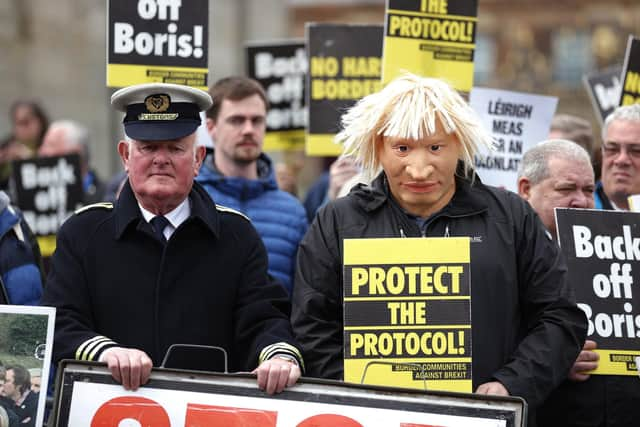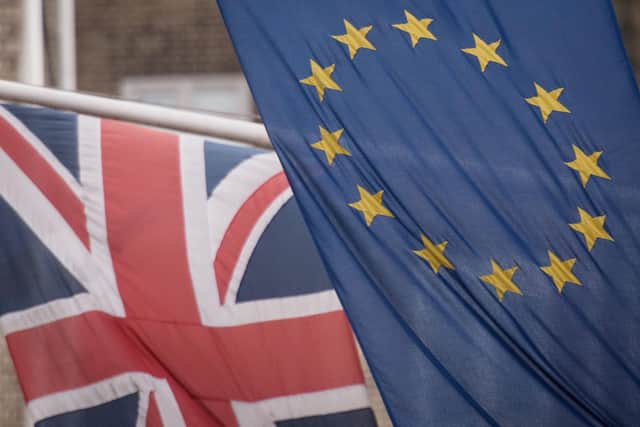Northern Ireland Protocol: How does the Northern Ireland Protocol work, why are there problems and what could happen next?
Boris Johnson is poised to introduce a new law to override parts of the agreement, which could open the door to a trade war with Brussels.
The European Union has already warned it could retaliate in this scenario by introducing trade sanctions.
Advertisement
Hide AdAdvertisement
Hide AdBut what is the Northern Ireland protocol and what could happen next?


What is the Northern Ireland Protocol?
The Northern Ireland Protocol is part of the Brexit deal Boris Johnson agreed in January 2020.
Governing how businesses trade between Great Britain and Northern Ireland, the latter needed its own deal as it borders with an EU country – the Republic of Ireland.
Before Brexit it was easy to transport goods across this border because both sides automatically followed the same EU trade rules.


However, because the EU has strict food rules and requires border checks when certain goods arrive from non-EU countries, a new system was needed.
Both sides agreed they had to avoid a “hard border”, but that meant putting Northern Ireland under some EU rules.
How does the protocol work?
Instead of checking goods at the Irish border, the protocol agreed that any inspections and document checks would take place between Northern Ireland and Great Britain instead.
Northern Ireland ports would check on GB good to make sure they comply with EU rules and also follow EU product standards.
Advertisement
Hide AdAdvertisement
Hide AdProducts shipped from Northern Ireland to Great Britain are largely unaffected by the protocol. The red tape instead applies on movement in the other direction.
What are the problems with the protocol?
Under the protocol, customs declarations are required on all goods moving from Great Britain to Northern Ireland.
This creates extra paperwork for meat and other animal products, as well as physical checks.
There are certain grace periods, but the UK says the requirements are being enforced too harshly, which in turn is hurting business.
The UK Government’s own paper said it was causing “significant disruption to long-standing trade”, despite having negotiated it themselves.
Mr Johnson now wants the EU to get rid of all checks and paperwork between Great Britain and Northern Ireland, ensure that goods that remain in Northern Ireland only need to meet British standards, and to remove the role the European Commission and the European Court of Justice have in overseeing how the protocol works.
What is the EU perspective?
The EU has ruled out renegotiating the text of the protocol, but has set out its own proposals.
These include an 80 per cent reduction in checks on food products, halving the amount of paperwork, and relaxing rules on chilled meats.
Advertisement
Hide AdAdvertisement
Hide AdIn return, they have asked for extra safeguards to stop products from Great Britain crossing into the Republic of Ireland.
This has gone down disastrously, with ministers arguing it was an attempt to hurt Britain and "worsen the current trading arrangements".
The EU has shown a united front on the protocol, with German chancellor Olaf Scholz calling for the UK to avoid taking unilateral action, and Belgian Prime Minister Alexander De Croo saying not abiding by the deal would create a significant problem for the EU’s internal market.
Why is it a big issue again?
Talks have been going back and forth with the EU since the deal was first agreed, but the Northern Ireland election results have made a long-standing issue even more volatile.
Unionist parties say placing a border across the Irish Sea undermines Northern Ireland's place within the United Kingdom.
The post-Brexit checks on goods moving from Great Britain to Northern Ireland are fiercely opposed by unionists and loyalists in Northern Ireland.
They argue the creation of an “Irish Sea border” poses a threat to the place of Northern Ireland in the UK.
Now the Democratic Unionist Party (DUP) are refusing to take part in Northern Ireland's power-sharing government until its concerns are resolved.
Advertisement
Hide AdAdvertisement
Hide AdDespite coming second to Sinn Fein, who accept the protocol, a new Northern Ireland government cannot be formed without the DUP.
What happens next?
Mr Johnson continued to threaten to act if the EU’s position does not change, and has said things are different now due to the Covid and the Ukraine crisis.
A trade war would be disastrous for both sides, but remains a possibility if no agreement is reached.
However, both sides will be hoping to avoid this, especially given the need to present a united front in the face of Russian aggression.
Any move to tear up the protocol could also damage the UK’s reputation, with former prime minister Theresa May urging ministers to consider "what such a move would say about the United Kingdom and its willingness to abide by treaties which it has signed".
Julian Smith, the Tory former Northern Ireland secretary, has the most likely solution, which is locking negotiators in a room to negotiate a "fudge".
He said: “I think there is a landing zone where east/west checks are more or less removed, where the regulatory divergence, the challenges that come of UK goods and EU goods in the same Northern Ireland market that there can be fudges there.
“I think we do need the EU and UK negotiators to spend some positive time in a locked room and come up with a deal. We need a political deal, we need a fudge.”
Foreign secretary Liz Truss is now expected to announce plans for legislation to override parts of the protocol on Tuesday, but no draft bill is expected.
Comments
Want to join the conversation? Please or to comment on this article.

